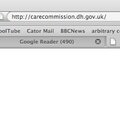Following the Health White Paper in July, Paul Corrigan wrote a fantastic series of posts analysing Andrew Lansley's proposals. It wouldn't be an exaggeration to say that it was the best thing out there on the White Paper - so good that I collected them into a handy series of posts.
Well, he's at it again.
This time, Paul has looked beyond the current and apparent position of strength Lansley finds himself in (as a man with a plan) and identified four potential issues that can make current strengths into weaknesses.
Each of these four themes is linked to below, with a choice quote taken from each. Even if you have a passing interest in health, social care or the political process for major reform, I urge you to read them all.
1. Are the NHS reforms owned by the Government as a whole and how strong is Andrew Lansley’s position as the main exponent of that reform?:
So the political strength behind the NHS reforms is that the Cabinet and the Prime Minister support Andrew Lansley. The political weakness is that no one apart from him, including the Prime Minister, 'gets it'.
2. Where will the politics of NHS reform in October 2010 stir up some enthusiasm?:
I may be wrong but I get the impression that the current Secretary of State doesn’t think this is his job. I think he genuinely believes that since he is removing ‘NHS bosses’ from the NHS, then enthusiasm will simply "spring forth" of its own accord. This may also be how they think of the Big Society - that all this energy has just been suppressed and therefore it is somehow wrong for members of the Cabinet to go around stirring it up. Waiting for others to do this will not work.
3. The politics of NHS reform in October 2010 - Will the Change Process Work?:
The current Secretary of State did not come down from his revolutionary pre-election base in the mountains with thousands of Conservatistas who could run the NHS in the new revolutionary way. He has no-one. He may believe that there are groups of bandoliered GPs ready to take on PCTs and fight for GP Consortia (All power to the GP commissioning consortia!) But the few there are, are not enough. The people who will make change happen are the people who are going to be sacked and have always rather liked the old system.
4. NHS resources between now and the proposed abolition of PCTs in April 2013 - Will the sums add up or will there be deficits?:
This means that for the next three years there will be two conflicting systems for the distribution of finance at work in the NHS. One that believes the finance should be controlled by a hierarchy which goes from the DH down to the SHA to the PCT, the other that believes it is the job of the PCT to look out for its local population and buy the best health and health care they can find.
(*Long post title in honour of Paul's own length blogpost titles!)






No Comments
Leave a comment